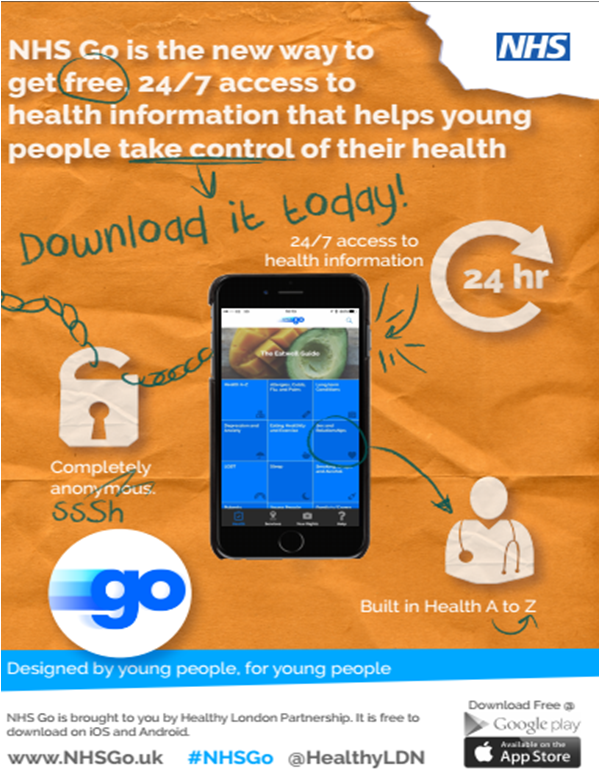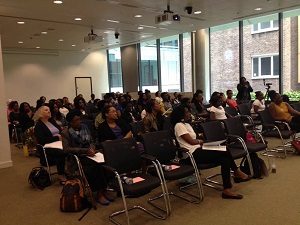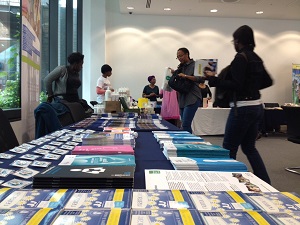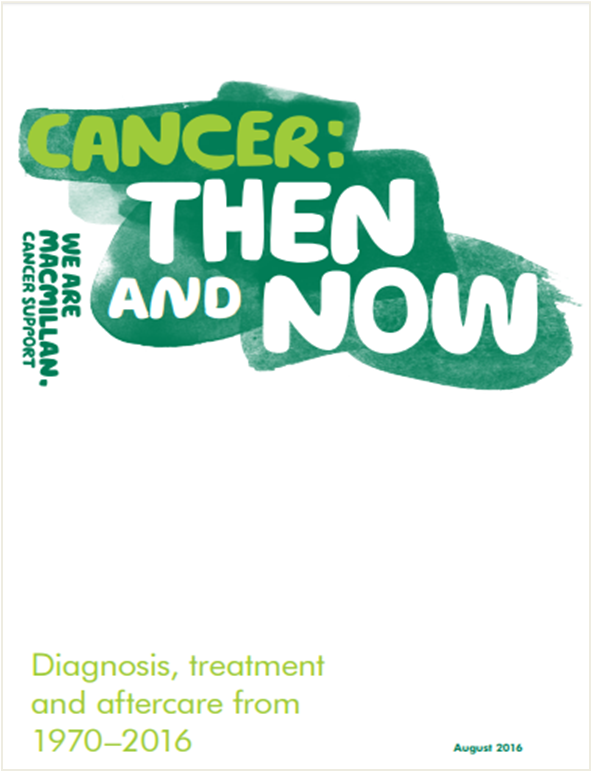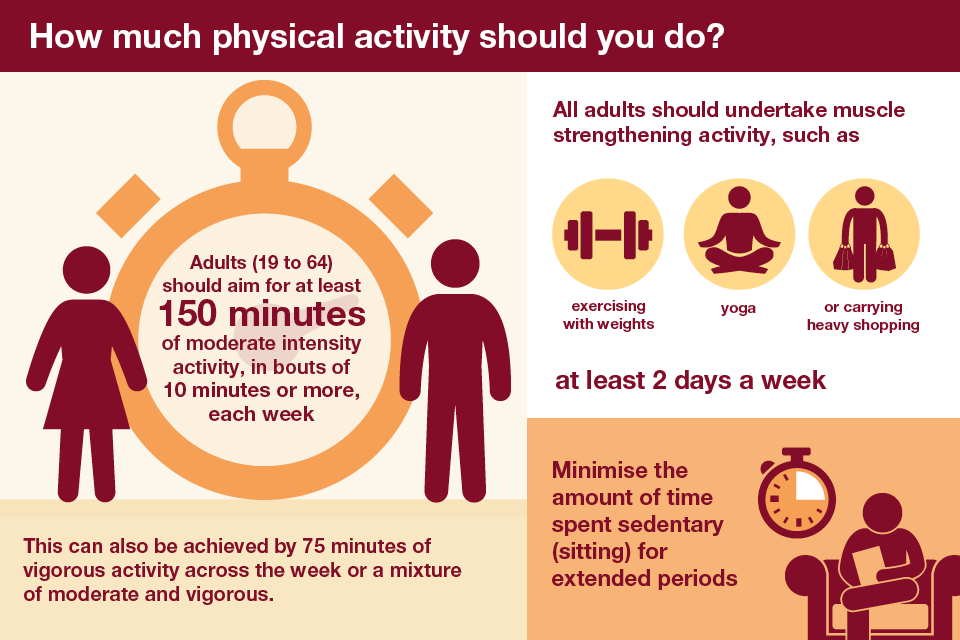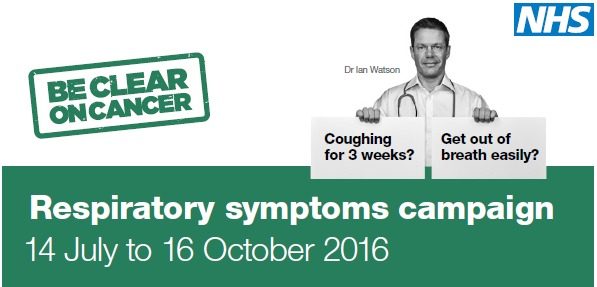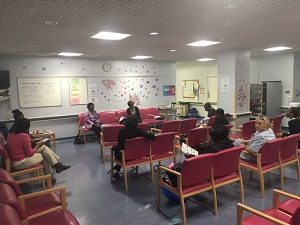Saturday was a really exciting day for us as we hosted our first fibroids conference, Fibroid Focus. The theme of the conference was treatment and we aimed to provide an in-depth look at all treatment options including natural options.
The day started with an introduction by our founder, Abi Begho, who welcomed everyone, explained the aim of the day and briefly summarised the work we’ve been doing on fibroids. This work has included conducting a survey to understand the needs of black women with fibroids, forming an expert panel, developing a booklet and organising awareness events.
You can watch a clip of Abi talking about the event here
Exercise and Fibroids

We first heard from Lillian Lartey the founder and CEO of I Want My Body Back. Lillian discussed exercise and fibroids and we learnt that exercise has been shown to be beneficial in reducing the risk of developing a number of hormone-dependent conditions such as breast cancer and hence we expect that it will also be beneficial in preventing fibroids but also in improving symptoms as part of a healthy lifestyle. Lillian explained that stress is an important factor as any benefits of exercise are cancelled out if we are experiencing persistent stress in our lives. Finally, Lillian reminded us that we should be aiming for 30 minutes of moderate exercise a day and that we shouldn’t consistently take part in long bouts of exercise as this can put pressure on our body. Lillian ended with three suggestions on how to move forward:
- Check your lifestyle – how will exercise be a part of your life?
- Choose the right type of exercise for you and avoid stress-induced exercise
- Manage your stress – this is more than just resting but managing your thoughts.
You can watch a clip of Lillian’s talk here, download her presentation in the section below this blog piece, listen to her full presentation here and you can read our blog on fibroids and exercise here.
Diet and Fibroids

Next we heard from Leah Salmon, The Naturally You Coach, who spoke about diet and fibroids. Leah stressed that food is more than something that we eat three times a day because it tastes nice, food is medicinal. To reap the benefits of food and to fight disease we need to have a solid foundation of nutrients for our body to build on. To achieve this Leah advised that we make at least 50% of our diet unprocessed foods. Leah explained that fibroids have been linked to a number of nutritional deficiencies such as vitamin D, magnesium and essential fatty acids. Leah stated that we can use our diet to prevent the deficiencies that lead to the fibroids or, if we have fibroids, use nutrition to re-balance the deficiencies, build and repair the body and stop the fibroid tumours from growing. Leah then recommended nine foods that can achieve this:
- Irish Moss and sea weed
- Bone broth and oily fish
- Evening Primrose Oil
- Molasses
- Tumeric
- Garlic
- Green smoothies and vitamin C rich food
- Vitamin D
- Water
Leah also warned us about six foods we should avoid:
- Xenoestrogens (growth hormones in commercially reared animals and can thus be found in red meat, poultry and eggs and also BPA, found in some plastics)
- Alcohol and caffeine
- White sugar
- Processed grains
- Trans and hydrogenated fats
Finally, Leah stated that success in this area is all about our mindset and we need the willingness to change, the stamina to commit to a healthy lifestyle and patience.
You can download Leah’s slides below this blog, watch clips of Leah’s talk here and here, listen to her full presentation here and you can read more about diet and fibroids here.
Medical Treatment and Fibroids

We also heard from Rajiv Varma, a consultant gynaecologist at the Nuffield Hospital, who presented on the medical management of fibroids. Mr Varma first described some of the effects of fibroids such as challenges with fertility, problems during pregnancy and a number of symptoms that affect a woman’s quality of life, but he did stress that most women with fibroids do not experience these problems.
Mr Varma explained the treatment options available and these include:
- Doing nothing (watchful waiting)
- Drug treatments – mainly used to shrink fibroids before surgery or to relieve symptoms
- Procedures
- Uterine Artery Embolisation (UAE) – cuts off blood supply to the fibroids
- Surgery – to remove the fibroids
Mr Varma then gave us some really good insight and advice on a number of issues:
NHS treatment vs. private treatment: He stated that in an ideal world there would be no difference between NHS and private treatment but unfortunately there can be some issues with NHS care such as: lack of choice, long waiting times and limited treatment options. There are a number of benefits though which include: the NHS is better equipped to deal with complex cases, easy access to supportive services (such as blood transfusions and intensive care), the consultant is present and other specialists are available.
Second opinions: Mr Varma explained that we are entitled to get a second opinion and the situations where he would advise that a woman seeks a second opinion are: if you are unhappy with the treatment and management options that have been presented to you; if you lose confidence in your doctor; and if there is poor communication between yourself and your doctor.
Finding the right doctor: he stated that the most effective way of finding the right doctor is to have insider information and nurses are the best people to get information on who the best doctors are.
Herbal Remedies and Fibroids

Patricia Ferguson, a Medical Herbalist and a member of the College of Practitioners of Phytotherapy, then discussed herbal remedies that have been shown to be effective in treating fibroids. These remedies either contribute to shrinking the fibroid or are effective at managing some of the symptoms. They are as follows:
Vitex Berries (or agnus cactus) – act on the pituitary gland and depress oestrogen and progesterone (both of which can stimulate the growth of fibroids).
Shepherds Purse – can be effective in treating heavy menstrual bleeding
Red raspberry leaf – can help control heavy menstrual bleeding and can help shrink fibroids
Nettle leaves- can be effective in reducing heavy bleeding
Yarrow – helps to stop the growth of fibroids
Thuja – helps to stop the growth of fibroids
Burdock Root – can improve liver function and may inhibit the growth of fibroids
Milk Thistle – improves liver function and therefore can help the live control oestrogen levels
It was also noted that before taking any of these herbal preparations women should seek advice from a medical herbalist as some of the above shouldn’t be taken if a woman is pregnant or if she is on certain medication.
You can download a copy of the handouts to this presentation below this blog and read about some research on complementary and alternative medicine and fibroids here.
Managing the Emotional Impact of Fibroids

Finally, Olivia Haltman discussed the emotional impact of fibroids and how to manage this. Olivia explained that women may experience a number of emotions when going through their fibroid journey. This starts before the diagnosis with some women experiencing fear of the unknown due to symptoms. There can be a significant amount of anxiety whilst waiting for results and after receiving results, there can be a feeling of loss of control and hopelessness where you feel like you can’t control the outcome. Additionally, the vaginal examination can cause a significant amount of stress particularly for women who have had a traumatic sexual experience in the past.
Once a woman has received a confirmed diagnosis she may feel a fear of the growth of her fibroids and experience some unease about how her employers may respond, for example, missed days from work due to symptoms. Additionally, she may have anxiety over her fertility and then feel overwhelmed by the treatment decision.
The emotional impact may also include loss of focus, mood swings, panic attacks, lack of self-esteem, irrational emotions, fears regarding relationships and severe premenstrual syndrome.
So, fibroids can have a significant emotional impact on women which, in many cases, go unrecognised. These issues need to be addressed so that women can heal and move on.
Olivia provided some tips on how to start dealing with the emotional impact and these were:
- Educating yourself about fibroids – this can be empowering allowing you to make informed decisions about treatment
- Relaxation and breathing techniques
- Ground techniques
- Writing as therapy
- Positive thinking techniques
- Talking to your partner, friends and family
- Talking therapy
- Healthy eating
- Holistic lifestyle
Olivia finished by summarising tips from HysterSisters which were:
- Don’t play the blame game
- Don’t dwell on the what if’s
- Don’t compare yourself to others
- Give yourself time to heal emotionally as well as physically
- Don’t underestimate how much your hormones affect your emotions
- Don’t do it alone
- Do move on
Conclusions
The event ended with a really good summary from The Lake Foundation’s trustee, Fadzai Marange, who shared a little of her personal experience with fibroids, summarised the talks and appealed to women to follow Leah Salmon’s advice regarding the watchful waiting option i.e. if you have been diagnosed with fibroids and your doctor says: ‘ let’s watch and wait’, don’t be passive during this time, act – adopt a healthy lifestyle and see what you can do naturally. Finally, Fadzai encouraged women to visit their doctor and check whether they have a vitamin D deficiency as this is strongly linked to fibroids.
The Exhibitors
 At this event were a number exhibitors including:
At this event were a number exhibitors including:
Together they:
- Provided information on fibroids;
- Provided information on the support available for women affected by fibroids;
- Provided information on health and well-being programmes;
- Sold health and well-being books;
- Sold natural feminine hygiene products; and
- Sold natural hair and skin care products.
We also had ‘Meet the Exhibitor’ sessions on the agenda giving attendees the opportunity to hear organisations talk about their work.
Thank you
We had a great day and would like to thank everyone who attended, shared their story and for being a fantastic, engaged audience. We’d also like to thank all the speakers for their thought-provoking, informative presentations and all the exhibitors for attending and sharing their information, services, products and knowledge.
Finally, we’d like to thank Black History Walks, Natracare and Noire Wellness for their support.








